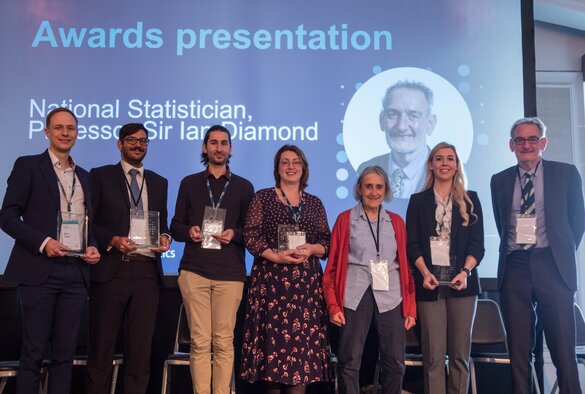
Dr Mark Green (far left) receiving his award at the De Vere Grand Connaught Rooms in London
University of Liverpool research that delivered highly tailored, data-driven insights to local authorities in the battle against COVID-19 secured the main Project Award at the prestigious Office for National Statistics Research Excellence Awards 2021.
Dr Mark Green, Lead Researcher on the winning Local Data Spaces project, and Senior Lecturer in Health Geography in the University’s Department of Geography and Planning, said: “We are honoured to receive this prestigious Office for National Statistics (ONS) award. I am really proud of how our team worked at pace to support urgent policy needs during a global crisis.
“The pandemic has shown the importance of getting the right data into the right hands.
“Local Data Spaces helped to open up new sources of data to local authorities and helped them proactively respond to COVID-19.”
By combining ONS datasets with ESRC Consumer Data Research Centre (CDRC) data, Local Data Spaces created innovative, highly tailored reports on the impact of the pandemic to inform policy strategy at ten English local authorities.
In Liverpool, the reports identified that in sections of the community where confidence in internet use was low, people were less likely to use lateral flow tests. This led to local efforts to promote testing beyond social media, feeding these insights into the national roll-out of lateral flow testing that helped re-open workplaces and schools following the January lockdown.
In Norfolk, analysis showed that furloughed workers were more than three times more likely to contract COVID-19 than those who were employed or self-employed, suggesting more could be done to prevent the spread of COVID-19 outside of workplaces. A similar pattern was observed in most places nationally.
The research revealed, across England, that rates of COVID-19 did not significantly vary between men and women within different work sectors or occupations. But, there was a higher rate of COVID-19 in women employed in personal services jobs – hairdressers, cleaners, beauticians – at the start of the second wave. Findings from this work were presented to the Government’s Scientific Advisory Group for Emergencies (SAGE) to help inform national policy around gender inequalities.
Professor Alex Singleton, Professor of Geographic Information Science in the Department of Geography and Planning, and Co-Director of CDRC, said: “The strategic ESRC funding enabling the Local Data Spaces project perfectly illustrates the value and impact that can be unlocked by the social sciences when integrating consumer and government data within trusted research environments.”
The Office for National Statistics Research Excellence Awards 2021 were presented at a glittering ceremony at the De Vere Grand Connaught Rooms in London.
To read each of the ten local authority reports provided by the Local Data Spaces project, please visit https://data.cdrc.ac.uk/dataset/local-data-spaces